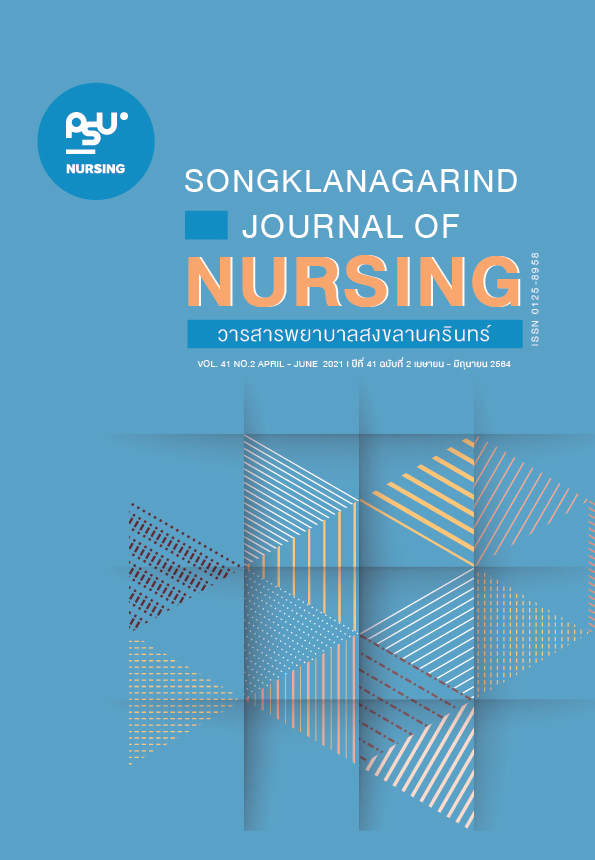A Qualitative Study of Factors Facilitating the Engagement of Sundanese Women in Cervical Screening
Main Article Content
Abstract
Objective: This study aimed to explore facilitators of Sundanese women to engage in cervical cancer screening. Methods: A qualitative study was used and data were collected through in-depth interviews. Fifteen Sundanese women at risk groups were recruited from several health clinics. Data were analyzed using four stages from Leininger’s method. Results: Findings revealed that factors facilitating Sundanese women to engage in cervical screening were 1) encouragement from a community health volunteer and a health care provider, 2) experienced of vaginal discharges (keputihan), 3) being at-risk of cancer group, 4) Muslim’s belief about obligations in making efforts (ikhtiar) to maintain their health, 5) friendly health care services 6) having health insurance. Discussion: It is recommended that strengthening the role of community health volunteers and health care providers on cervical screening in health services is needed. In addition, considerations of Sundanese women’s beliefs and their social networks towards cervical screening program are important to increase their engagement in cervical screening.
Article Details
References
De Souza JA, Hunt B, Asirwa FC, et al. Global health equity: Cancer care outcome disparities in high-, middle-, and lowincome countries. J Clin Oncol. 2016; 34(1): 6-13. doi: 10.1200/JCO.2015.62.2860.
Fitzmaurice C. The global burden of cancer 2013. JAMA Oncol. 2015; 1(4): 505-27. doi:10.1001/jamaoncol.2015.0735
Ministry of Health of Republic Indonesian. Situasi penyakit kanker [Situation of cancer disease]. Jakarta: Ministry of Health of the Republic Indonesia; 2015.
World Health Organization. Cancer country profile: Indonesia cancer country profile. 2014; 50: 1-4.
World Health Organization. WHO Guidelines for screening and treatment of precancerous lesions for cervical cancer prevention [Internet]. [cited 2016 Apr 12] Available from: https://www.who.int/reproductivehealth/publications/cancers/ 9789241505260/en/.2013.
Landy R, Pesola F, Castanon A, et al. Impact of cervical screening on cervical cancer mortality: Estimation using stage-specific results from a nested case-control study. Br J Cancer. 2016; 115(9): 1140-6. doi: 10.1038/bjc.2016.290.
Setyaningsih L. Kasus Kanker Serviks di Indonesia Terus Meningkat, Sebagian Besar Datang Ke Dokter Sudah Parah [Internet]. 2019 [cited 2019 May 21]. Available from: https://wartakota.tribunnews.com/2019/02/19/kasus-kanker-serviks
-di-indonesia-terus-meningkat-sebagian-besar-datang-kedokter-sudah-parah.
Centers for Disease Control and Prevention. Cervical Cancer Statistics. Division of Cancer Prevention and Control. 2014.
Islam NS, Zanowiak JM, Wyatt LC, et al. Diabetes prevention in the New York City Sikh Asian Indian community: A pilot study. Int J Environ Res Public Health. 2014; 11(5): 5462-86. doi: 10.3390/ijerph110505462.
Darj E, Chalise P, Shakya S. Barriers and facilitators to cervical cancer screening in Nepal: A qualitative study. Sex Reprod Healthc. 2019; 20: 20-6. doi: 10.1016/j.srhc.2019.02.001.
Raymond NC, Osman W, O’Brien JM, et al. Culturally informed views on cancer screening: A qualitative research study of the differences between older and younger Somali immigrant women. BMC Public Health. 2014; 14: 1188. doi:
1186/1471-2458-14-1188.
Morrison TB, Flynn PM, Weaver AL, et al. Cervical cancer screening adherence among Somali immigrants and refugees to the United States. Health Care Women Int. 2013; 34(11): 980-8. doi: 10.1080/07399332.2013.770002.
Guimond ME SK. Modesty matters: Cultural sensitivity and cervical cancer prevention in muslim women in the United States. Nurs Women Heal. 2013; 17(3): 210-6. doi: 10.1111/1751-486X.12034.
Hasnain M, Connell KJ, Menon U TP. Patient-centered care for Muslim women: Provider and patient perspectives. J Women Heal. 2011; 20(1): 73-83. doi: 10.1089/jwh.2010.2197.
Roger. The Sundanese people of West Java Indonesia [Internet]. 1999 [cited 2016 Jun 30] Available from: http://www.sunda.org/sundanese/sundanese.htm.
Padela AI CF. Religion and disparities: Considering the influences of Islam on the health of American Muslims. J Reli Health. 2013; 52(4): 1333-45. doi: 10.1007/s10943-012-9620-y.
Rajaram SS RA. Asian-Islamic women and breast cancer screening: A socio-cultural analysis. Women & Health. 1999; 28(3): 45-58. doi: 10.1300/J013v28n03_04.
Central Bureau of Statistics Cimahy City. Cimahi in Figure. Kota Cimahi: Central Bureau of Cimahi City, West Java, Indonesia; 2018.
Leininger M. Overview of the theory of culture care with the ethnonursing research. J Transcult Nurs. 1997; 8(2): 32-52. doi: https//org/10.1177/104365969700800205.
Leininger MM. Ethnonursing: A research method with enablers to study the theory of culture care In M. M. Leininger & M. R. McFarland (Eds.), Culture care diversity and universality: A worldwide nursing theory. 2 nd ed. Boston, MA: Jones & Bartlett; 2006. 43-81 p.
Dang J, Lee J, Tran JH. Knowledge, attitudes, and beliefs regarding breast and cervical cancer screening among Cambodian, Laotian, Thai, and Tongan women. J Cancer Educ. 2010; 25(4): 595-601. doi: 10.1007/s13187-010-0082-1.
Ncube B, Bey A, Knight J, et al. Factors associated with the uptake of cervical cancer screening among women in portland. Jamaica N Am J Med Sci. 2015; 7(3): 104-13. doi: 10.4103/1947-2714.153922.
Mukama T, Ndejjo R, Musabyimana A, et al. Women’s knowledge and attitudes towards cervical cancer prevention: A cross sectional study in Eastern Uganda. BMC Womens Heal. 2017; 17(1): 9. doi: 10.1186/s12905-017-0365-3.
World Health Organization. Cancer country profile: Indonesia cancer country profile. 2014; 50: 1-4.
Raymond NC, Osman W, O’Brien JM, et al. Culturally informed views on cancer screening: A qualitative research study of the differences between older and younger Somali immigrant women. BMC Public Health. 2014; 14: 1188. doi: 10.1186/1471-2458-14-1188.
Ndikom CM OB. Awareness, perception and factors affecting utilization of cervical cancer screening services among women in Ibadan, Nigeria: A qualitative study. Reprod Heal. 2012; 6(9): 11. doi: 10.1186/1742-4755-9-11.
Lee EE, Tripp-Reimer T, Miller AM, et al. Korean American women’s beliefs about breast and cervical cancer and associated symbolic meanings. Oncol Nurs Forum. 2007; 34(3): 713-20. doi: 10.1188/07.ONF.713-720.


